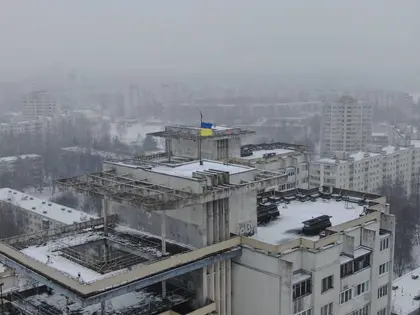Mikalaj Packajeu, head of the Association of Belarusians in Great Britain said that Ukraine can only be safe if there is a democratic Belarus and where Russian forces are banned from its territory.
“There are about 2,000 Belarusian volunteers fighting the Russians in Ukraine. These include the Kastuś Kalinoŭski regiment and other Belarusian units within the Armed Forces of Ukraine [AFU], who in the future with their combat experience will form the nucleus of a strong national army of Belarus. They are working with Ukrainian military intelligence in Special Operations, and as drone specialist operators.”
JOIN US ON TELEGRAM
Follow our coverage of the war on the @Kyivpost_official.
Packajeu, a legal researcher and international risk consultant, said any settlement must remove the danger of a dictator like Alexander Lukashenko or a successor like him being propped up.
Distant relations between Ukraine and Belarusian opposition
The 49-year-old from Minsk responded to reports of friction between Volodymyr Zelensky’s government in Ukraine and the Belarusian opposition who would have wanted help in toppling Lukashenko. The Ukrainian government’s view is to not antagonize Lukashenko for fear of invasion.
Packajeu, whose organization is non-political, offered his personal opinion and reeled out a list of Ukrainian presidents who were friendly with Lukashenko and then added: “No Ukrainian politician after Viacheslav Chornovil [leader of Rukh, the People’s Movement of Ukraine] has had any links with the Belarusian opposition. They have all avoided it.

Latest on Russia’s Intransigence to End War Against Ukraine
“There were very powerful interests in Ukraine before the war, trading with the Lukashenko regime – companies owned by his administration. Then, in 2020, the Ukrainian government failed to join the EU, Britain and U.S. in [applying] sanctions against the Lukashenko regime.
“The Ukrainian security services were cooperating with Lukashenko’s security services up to the beginning of the war. The avoidance of the Ukrainian government in having relations with the Belarusian opposition is based on a false premise.
“There are suspicions that those involved in trade with the Lukashenko regime before the war will be eager to start their operations and for that they would need good relations.
“People in Ukraine have been asking why the government is keeping its ambassador in Minsk, despite Lukashenko’s ambassador having left Kyiv.
“What the Belarusian opposition would like is for the Ukrainian government to come into line with the U.K. position and to join the sanctions and give the Belarusian opposition the same level of support as the EU and U.K.”
Lukashenko’s vulnerabilities
Keeping his finger on the pulse and following peoples’ conversations on social media, Packajeu, whose organization is based in London, said: “The state media in Belarus is advancing the propaganda that Belarus must be loyal to the Kremlin regardless and Russia cannot be defeated.”
In his opinion, this puts Lukashenko in a very vulnerable situation if Russia starts to lose Ukrainian territory. “There is no argument they can mobilize the population around any war objectives because they have no independent Belarusian objectives against Ukraine,” he said.
Since the 2020 fraudulent elections which saw mass protests, and with Lukashenko allying himself with Putin’s war, Packajeu has observed that support for his leadership has fallen even more, and that he wouldn’t risk sending Belarusian boots into Ukraine.
“I don’t expect Lukashenko to commit his forces, not because he doesn’t want to, but because he has nothing to commit. The number of people wearing green in Belarus is about 45,000 of which five to 8,000 are potentially combat ready troops.
“Those troops are the ones Lukashenko relied on for domestic repression back in 2020, so he can hardly risk losing them. As for the Russians, they can probably see an advantage in him continuing as he has been. They have a safe base to train, to repair their equipment and have access to any military facilities in Belarus.
“If Belarusians were forced to fight, they would not loot or plunder or commit atrocities against civilians – I would expect them to surrender en masse to Ukrainians.
Belarusian support for Ukraine became obvious within days of Russian President Vladimir Putin’s full-scale invasion in February last year. Acts of sabotage in Belarus on Russian troops heading towards the border of Ukraine with their goal to take Kyiv became evident.
“Those that were caught received very long sentences of more than 10 years. Others had their knees shot through,” said Packajeu. “The diaspora sent its first consignment of medical and humanitarian aid to Belarusian volunteers fighting in Ukraine as early as March last year.
“We responded to requests for vehicles for our fighting units and two ambulances with resuscitation equipment. At rallies in the U.K., Belarusians are seen waving their red and white flags.”
A Lutheran by religion, Packajeu doesn’t think the Belarusians have enough resources to rise up against Lukashenko. Russian troops being stationed in Belarus makes that even harder.
“Lukashenko’s regime is so reliant on Russia’s economic assistance, that if Putin’s Russia was defeated, Lukashenko’s regime would become unviable,” he said.
Until that happens, Belarusians can only hope for a better future. As Packajeu added: “Ukraine’s victory does not guarantee anything for Belarusians.
“If Ukraine were to fall, there would be no realistic hope for Belarusians for generations, to regain their own country from the Russian de-facto military occupation that the Lukashenko regime has been domestically secured by way of its long-standing reign of terror.”
You can also highlight the text and press Ctrl + Enter










